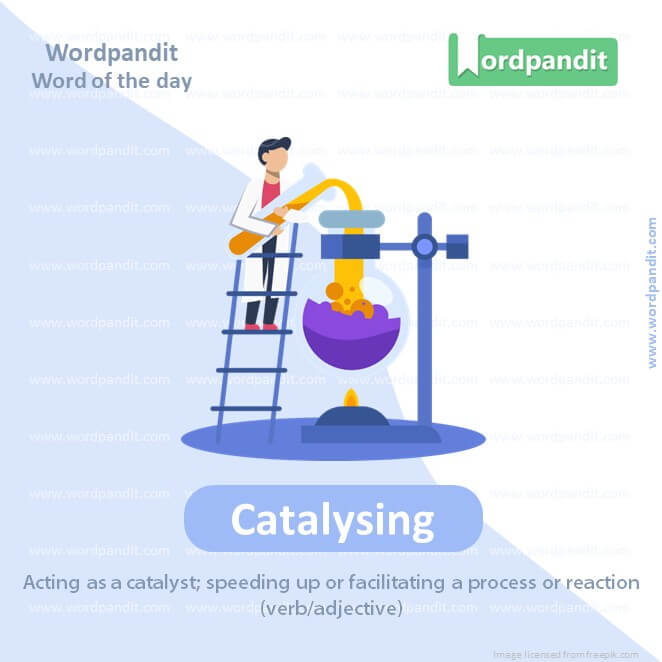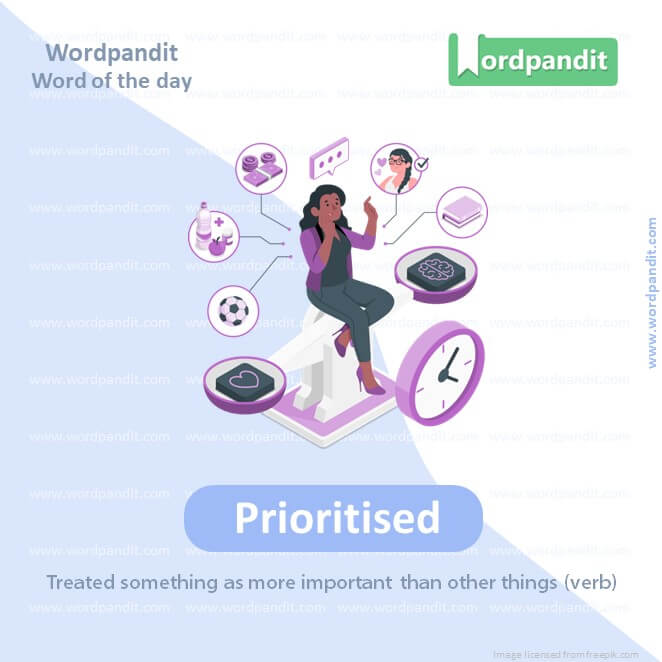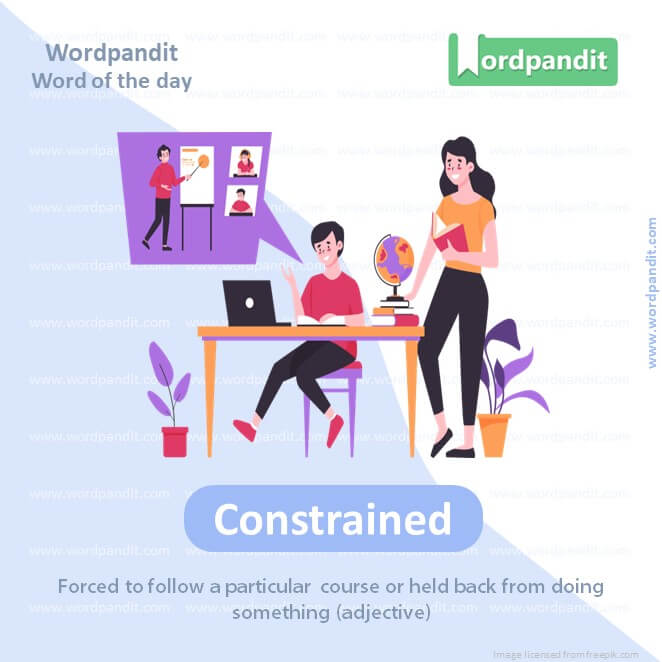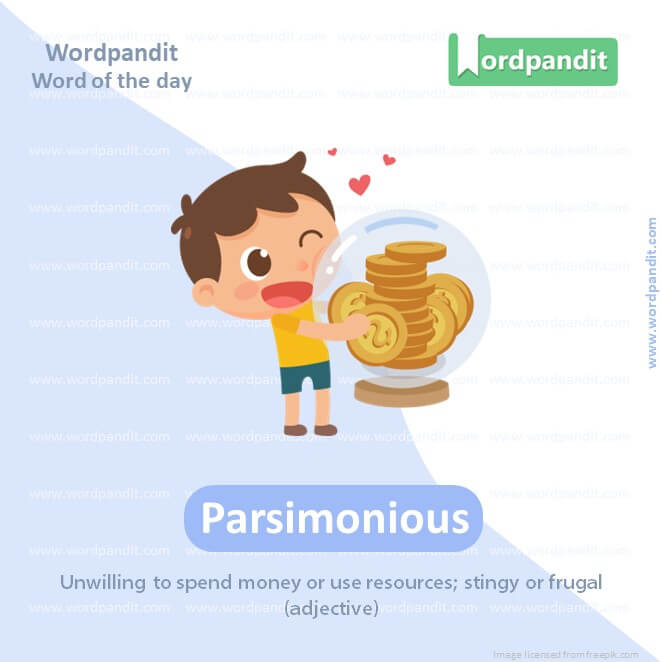Daily Vocabulary Words: List of Daily Used Words in Leading Indian Newspapers
Hi there. Welcome to this special section @ Wordpandit. Our endeavour here is straightforward: highlighting daily vocabulary words that you would come across in leading newspapers in the country. We have included the following newspapers in our selection:
• The Times of India
• The Economic Times
• Hindustan Times
• Mint
• Indian Express
We are putting in extensive work to develop your vocabulary. All you have to do is be regular with this section and check out this post daily. This is your repository of commonly used words; essentially, we are posting a list of daily used words. Hence, this has significant practical application as it teaches you words that are commonly used in leading publications mentioned above.
Visit the website daily to learn words from leading Indian newspapers.
WORD-1: Tangible
Explanatory Paragraph: Imagine you can touch and feel your toy; it’s real and you can see it. That’s what tangible means: something you can touch or clearly see, like your toys or your food.
Meaning: Capable of being touched or felt; having physical form and substance (adjective).
Pronunciation: tan-juh-buhl
Synonyms: physical, real, concrete, material, palpable
Usage Examples:
1. She received a tangible gift from her friend.
2. The results of the experiment were tangible.
3. There was no tangible evidence of the crime.
4. The charity aims to provide tangible help to the needy.

WORD-2: Catalysing
Explanatory Paragraph: Think about when you mix baking soda and vinegar in your volcano project, and it explodes. Catalysing is like starting or making something happen really fast, just like the explosion in your project.
Meaning: Acting as a catalyst; speeding up or facilitating a process or reaction (verb/adjective)
Pronunciation: kat-uh-lahy-zing
Synonyms: accelerating, spurring, triggering, activating, initiating
Usage Examples:
1. The new policy is catalysing economic growth.
2. Enzymes help in catalysing chemical reactions in our body.
3. The seminar aimed at catalysing a change in public opinion.
4. The innovation is catalysing new developments in technology.

WORD-3: Prioritised
Explanatory Paragraph: Imagine you have homework and playtime. If you do your homework first because it’s more important, you have prioritised your homework. It means choosing to do the most important things before others.
Meaning: Treated something as more important than other things (verb).
Pronunciation: prahy-uh-ri-tahyzd
Synonyms: ranked, emphasized, foregrounded, highlighted, favored
Usage Examples:
1. She prioritised her studies over her social life.
2. The company prioritised safety during the production process.
3. Health issues were prioritised in the budget allocation.
4. The teacher prioritised reading skills in the curriculum.

WORD-4: Constrained
Explanatory Paragraph: Imagine wearing shoes that are too tight; they hold your feet tightly and you can’t move freely. Constrained is like that, when something is held back or limited and can’t be free.
Meaning: Forced to follow a particular course or held back from doing something (adjective)
Pronunciation: kuhn-straynd
Synonyms: restricted, limited, confined, restrained, inhibited
Usage Examples:
1. The artist felt constrained by the strict rules.
2. Budget constraints limited the scope of the project.
3. She felt constrained by social norms.
4. The room was small and felt constrained.

WORD-5: Distorting
Explanatory Paragraph: Imagine looking through a funny mirror at a carnival that makes you look really tall or super short. Distorting means changing the way something looks or sounds so it’s different from the real thing.
Meaning: Changing the shape, appearance, or sound of something to make it look or sound different (adjective/verb)
Pronunciation: dis-tawr-ting
Synonyms: twisting, warping, altering, misrepresenting, skewing
Usage Examples:
1. The report was criticized for distorting the facts.
2. Loudspeakers can end up distorting the sound of music.
3. He accused the media of distorting his words.
4. The heat was distorting the plastic container.
WORD-6: Interim
Explanatory Paragraph: Interim is like when you’re waiting for your birthday party to start and you play a quick game to pass the time. It’s something temporary that happens in between other things.
Meaning: Serving or intended to serve for a temporary period; provisional (adjective).
Pronunciation: in-tuh-rim
Synonyms: temporary, provisional, stopgap, transitional, acting
Usage Examples:
1. An interim government was set up until elections could be held.
2. She was appointed as the interim manager.
3. The interim period was used to conduct research.
4. He worked in an interim position for six months.

WORD-7: Parsimonious
Explanatory Paragraph: Think of someone who has a lot of toys but only lets you play with one; parsimonious means being very careful with using or giving things, often too careful.
Meaning: Unwilling to spend money or use resources; stingy or frugal (adjective).
Pronunciation: par-si-mo-nee-us
Synonyms: stingy, frugal, miserly, thrifty, sparing
Usage Examples:
1. The parsimonious old man rarely spent money on luxuries.
2. Her parsimonious approach to budgeting helped her save a lot of money.
3. The government was criticized for its parsimonious funding of healthcare.
4. Despite his wealth, he led a parsimonious lifestyle.
WORD-8: Looming
Explanatory Paragraph: Imagine a big storm cloud coming closer to your house; that’s what looming is like. It means something big or important is about to happen and it feels a little scary or worrying.
Meaning: Appearing as a large and often threatening presence (verb).
Pronunciation: loo-ming
Synonyms: impending, approaching, imminent, forthcoming, threatening
Usage Examples:
1. The looming deadline made everyone anxious.
2. Dark clouds were looming over the city.
3. The possibility of a strike was looming over the company.
4. He was troubled by the looming crisis in his community.
WORD-9: Inflationary
Explanatory Paragraph: Think about a balloon getting bigger and bigger as you blow air into it; inflationary is like the balloon, it means things cost more money as time goes on, like if your favorite ice cream becomes more expensive.
Meaning: Related to or causing an increase in prices (adjective).
Pronunciation: in-flay-shuh-ner-ee
Synonyms: price-increasing, cost-escalating, inflating, rising, surging
Usage Examples:
1. The inflationary trend in the economy worried the shoppers.
2. The government tried to control inflationary pressures.
3. Inflationary effects made everyday goods more expensive.
4. Wage increases can sometimes lead to inflationary cycles.
WORD-10: Unsavoury
Explanatory Paragraph: Think about tasting food that is really yucky; unsavoury is used to describe things that are not nice or pleasant, like food that tastes bad or behavior that is not good.
Meaning: Disagreeable or unpleasant in taste or in character (adjective).
Pronunciation: un-sav-uh-ree
Synonyms: distasteful, disagreeable, unpleasant, offensive, repulsive
Usage Examples:
1. The unsavoury smell from the kitchen made her leave the room.
2. He was involved in some unsavoury activities in the past.
3. The article exposed the unsavoury aspects of the political campaign.
4. She didn’t like the unsavoury reputation of the nightclub.
Vocabulary SSC
Navigating the path to success in competitive examinations like the Staff Selection Commission (SSC) triggers a keen focus on ‘vocabulary SSC’. This collection of words, often prominent in SSC examinations, holds paramount importance, and forms a significant part of a candidate’s linguistic preparation. However, mastering ‘vocabulary SSC’ is a process that requires deliberate strategy and dedication.
To begin the journey with ‘vocabulary SSC’, a structured learning regime is key. Break the learning process into manageable chunks. Concentrate on a set number of words each day. This steady, consistent approach reduces the risk of burnout and enhances long-term retention of vocabulary.
The strategic use of memory aids can significantly boost the learning of ‘vocabulary SSC’. Utilize flashcards, memory apps, or even create personal mnemonics to help remember each word and its meaning more effectively. Associating a word to a personal event or object creates a lasting mental connection, making recall easier.
To truly master ‘vocabulary SSC’, it’s crucial to engage with the words in different contexts. Incorporating the words into daily reading and writing practices provides exposure to their usage in varied situations. This practical application reinforces the understanding of ‘vocabulary SSC’, enhancing the ability to employ these words accurately in the exam setting.
Regular revision is a must when preparing ‘vocabulary SSC’. Spaced repetition, interspersing the study with regular breaks, and regularly revisiting the words learned, ensures the words stay firm in your memory, ready to use when needed.
In essence, preparing ‘vocabulary SSC’ is an exercise in action-oriented constant learning. Strategic use of learning tools, practical application, and regular revision are key aspects of getting a grip on ‘vocabulary SSC’. As you stride through this process, you inch closer to acing your SSC examinations with an enriched vocabulary and boosted confidence.







